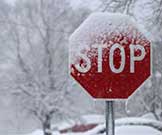|
|
 |
|
The
views expressed
on this page are soley those of the author and do not
necessarily
represent the views of County News Online
|
 |
MSN.com
How to prepare
for (any) high-impact winter storm
Angela Fritz
Washington Post
A severe winter storm with double-digit snowfall totals and potential
white-out conditions is just around the corner. Many roads will be
impassable and businesses may be shut down. Now is the time to prepare.
What’s so remarkable about this impending storm is the long duration of
wintry precipitation. Snow looks likely to start falling as early as
Friday afternoon and continue as long as Sunday afternoon. That means
there could be 48 hours, likely longer, when roads will be slippery at
best, and treacherous at worst.
The preparations you make over the next day or two should be to prevent
any need to get in the car. According to the Virginia Department of
Transportation, around 70 percent of winter weather-related deaths
occur in automobiles. This is avoidable, especially since we have so
much time to prepare.
With blizzard conditions expected — heavy blowing snow and wind gusts
to 40 mph — you really won’t want to even leave the house. The safest
place will be indoors.
Do you have enough food for your family for the long weekend? You will
not be able to order delivery — they won’t be able to drive on the icy
roads, either. Do you have enough toilet paper? Enough water in case
the pump fails? What if the power goes out — do you have the supplies
you need in a convenient location?
Winter storm best practices
Shop ahead and make sure you have enough food to get you through
Monday. Contrary to popular belief, you don’t have to stock up on just
bread and milk — go ahead and get whatever you normally shop for. The
Capital Weather Gang’s Kathryn Prociv suggests quick and easy things
like peanut butter and jelly, or non-perishables like soup so that they
won’t spoil if you don’t get through them this weekend. And don’t
forget the pet food!
Avoid carbon monoxide poisoning! “Never use a generator, grill, camp
stove or other gasoline, propane, natural gas or charcoal-burning
devices inside a home, garage, basement, crawlspace or any partially
enclosed area,” says ready.gov. “Locate unit away from doors, windows
and vents that could allow carbon monoxide to come indoors. Keep these
devices at least 20 feet from doors, windows, and vents...
Read the rest of the article at MSN.com
|
|
|
|

